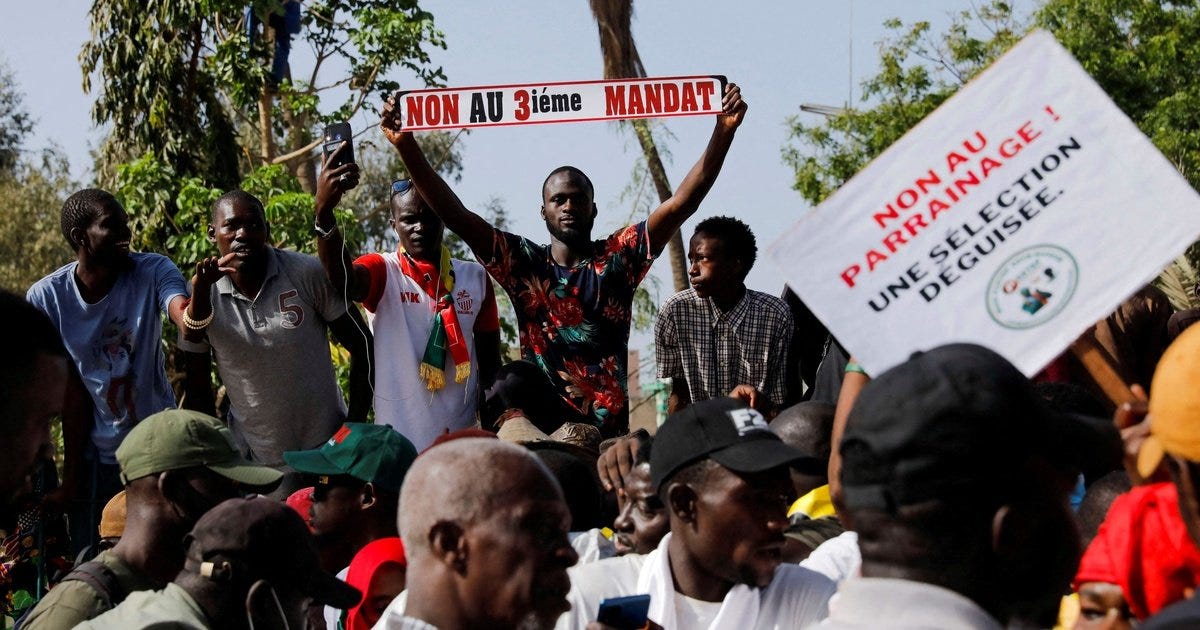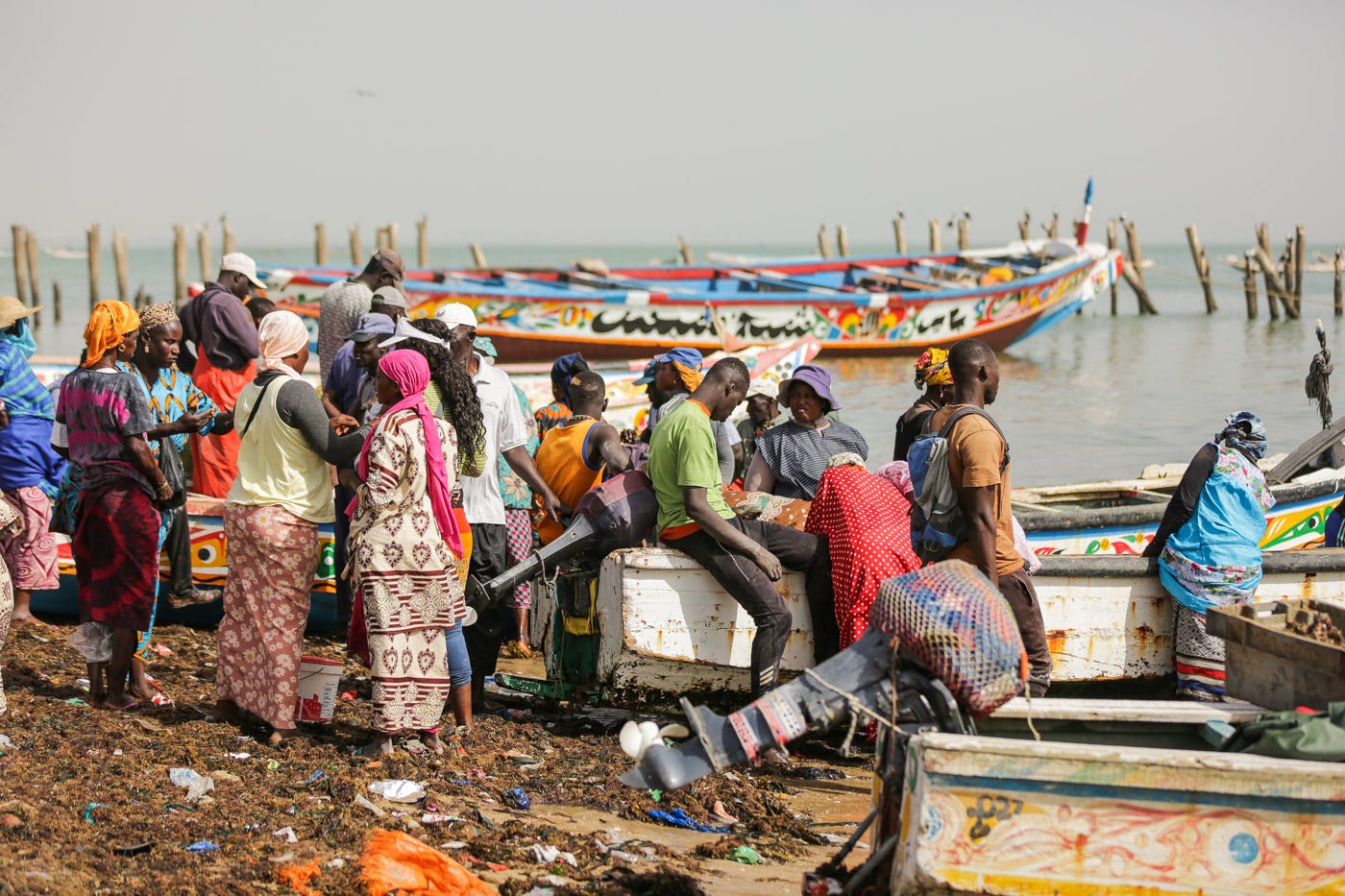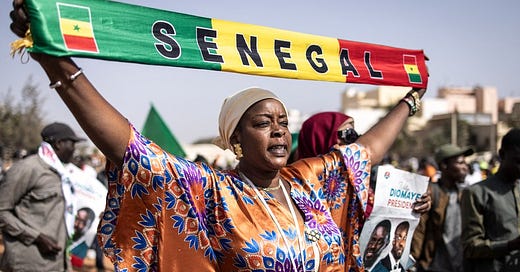It is crunch time in Senegal as Election Day draws closer
Beyond the outcome of Sunday's election, Senegal faces a moment of truth that could determine its future for years to come
Voters in Senegal will go to the polls on Sunday to cast a ballot in the 2024 presidential election, after a controversial delay to the vote sparked a constitutional crisis and exposed flaws in the country’s system of government.
A record 19 candidates are running for the top job, although the main contenders are believed to be former Prime Minister Amadou Ba of the ruling Benno Bokk Yaakaar coalition, or BBY; and Bassirou Diomaye Faye, a former tax inspector and general-secretary of the African Patriots of Senegal for Work, Ethics and Fraternity, or PASTEF, an opposition party that was dissolved last year by the government after it accused the party’s leaders of inciting “insurrectional movements.”
Anticipation is building ahead of Sunday’s vote, which many expect will be closely contested and some have predicted will be decided by a second-round runoff.
The crisis created by Senegal’s delayed vote seemed to catch most international observers unaware but it did not happen in a vacuum. Thus, it is necessary to situate the current moment in a broader context and recognize the relationship between events and issues as they have unfolded over the long haul.
How did Senegal get here?
On Feb. 3, President Macky Sall announced the indefinite postponement of Senegal’s presidential election citing a dispute over the candidate list for the election, a conflict between the legislature and the constitutional council and the need for an inquiry into corruption allegations leveled against two judges on the council.
Sall’s announcement came hours before the official campaign window was set to open ahead of Election Day, which was originally scheduled to be Feb. 25. Almost immediately, the announcement threw the country into a well of uncertainty, chaos and tension in what seemed almost like a befitting series finale for a drama that has gripped Senegal for three years.
The postponement triggered protests that were followed by a violent crackdown by security forces including at least four deaths, scores of injuries and the detention of many protesters. Shortly after Sall postponed the election, Senegal’s National Assembly passed a law that moved the election to Dec. 15, nearly 10 months after its initial date.
Senegal's constitutional council overturned Sall’s decree that delayed the vote as well as the law that rescheduled the election. Had it stood, the presidential vote would have been held more than eight months after Sall’s second and final term in office expires, a development which would have almost certainly opened another can of worms.
After several weeks of uncertainty that included a two-day national dialogue Sall organized, he dissolved his Cabinet, relieved Ba of his prime ministerial duties and announced that the election would hold on March 24, days before he is expected to step down on April 2. That announcement paved the way for a shortened campaign that began March 9 and is set to end today.
Meanwhile, Senegal’s legislature passed a controversial amnesty law for “acts relating to political protests held between 2021 and 2024,” when more than 60 people were killed in anti-government demonstrations across the country. The law authorized the release of hundreds of prisoners and detainees including Faye and his mentor, Ousmane Sonko — PASTEF’s leader and presidential candidate in the 2019 race — ahead of Sunday’s election.
Faye was detained in April 2023 on a string of charges including contempt of court, defamation and “acts likely to compromise public peace.” Sonko was jailed in July 2023 on charges of provoking insurrection, conspiracy with terrorist groups and endangering state security.

Senegal’s constitutional crisis had a long buildup
The latest crisis must be viewed in light of Sall’s second term which drew scrutiny early on for its autocratic bent and suspicion that he planned to extend his time in office in contravention of constitutional term limits.
The backlash against Sall’s postponement of the election was enveloped in 2021, when a series of recurrent demonstrations broke out across Senegal. The protests had their origins in popular anger at the government’s perceived mishandling of the COVID-19 pandemic — including allegations of corruption — but subsequently grew to include complaints against poor living conditions in the country and Sall’s authoritarianism.
They grew in intensity after Sonko was arrested on allegations of raping a young woman and making death threats against her. (Sonko was later acquitted of the rape charges but was convicted of “corrupting a youth” and also found guilty of a separate defamation charge brought against him by a government minister)
Sonko’s supporters saw the charges against him as politically motivated, given his profile as a charismatic critic of the government who struck a chord with Senegalese youths. Having finished in third place in the 2019 presidential race, Sonko was considered by many to be a strong contender for the next election. As a result, his supporters viewed the charges as an attempt by Sall to checkmate a political rival and took to the streets to demand his release.
Throughout the entirety of his legal ordeal, they kept up their protests during his court proceedings and held regular gatherings in solidarity with Sonko, who was barred from running in the 2024 presidential race due to his convictions.
The charges of “dictatorship” leveled against Sall by the protesters found more resonance due to his refusal to unequivocally disavow rumors of a bid for a third term. For several years, Sall sidestepped the issue, famously saying during a television interview when he said that his response to the question of whether he would seek a third term was “neither yes nor no.”
During Sall’s first term, Senegal shortened the length of its presidential term from seven to five years while keeping the two-term limit in place. Some of his supporters argued that the constitutional amendment “reset” the clock on his term limit, allowing him to seek a third term if he wanted one.
Sall’s opponents, however, saw his evasiveness as evidence that he planned to follow in the footsteps of Ivorian President Alassane Ouattara and Guinea’s Alpha Conde, both of whom orchestrated a change to their country’s constitution that enabled them to seek and get a third term in office. Buoyed by Sonko’s Yewwi Askan Wi coalition’s impressive showing in the 2022 municipal and national legislative elections, the opposition hardened its resolve to resist a Sall third-term bid and kept up the atmosphere of mobilization, protest and civil disobedience that played a role in his decision to foreswear a third term.
Tensions eased considerably after Sall’s announcement that he would not seek a third term, notwithstanding the lingering resentment felt by Sonko’s supporters, and Senegalese folks generally believed that the worst of the country’s political crisis was behind them until Sall postponed the presidential poll. Many do not believe his stated reasons for delaying the vote and continue to speculate about what they think his real motivations were.
A significant number believe that there was a real concern in the presidential palace that Faye would defeat Ba, whose selection as BBY’s candidate divided the ruling coalition. Some others saw the delayed vote as a fig leaf to create further confusion and uncertainty that would open a window for Sall to remain in power beyond the expiration of his mandate, which ends on April 2.
There are good reasons to believe either theory given the events of the last few years, but the first one is more plausible. Some Senegalese citizens anticipate — and in the case of Sonko’s supporters, perhaps expect—some form of score-settling against Sall and his acolytes in the event of a Faye victory.
Ba’s supporters have condemned Faye’s policy proposals — which include support for the creation of a new currency and a renegotiation of mining and energy contracts — as a radical departure from the status quo that they argue would weaken the economy, scare away international investors and derail the country from the path of prosperity on which they say Sall has put it.

Voters breathed a sigh of relief when Sall announced that he would comply with the council’s instruction to schedule the election before the end of his term. As voters gear up to go to the polls on Sunday, many Senegalese citizens hope that a free and fair election underpinned by a peaceful transition of power would close the chapter on a three-year nightmare that has witnessed deadly protests, a slowdown of economic output because of demonstrations and strikes, the destruction of businesses and infrastructure and a paralysis in government.
Viewing Senegal’s political crisis through a historical-structural lens
The constitutional crisis sparked by Sall’s postponement of Senegal’s presidential election gave way to a lot of anodyne commentary, including the usual overwrought description of the country as a “stable democracy” and a “beacon of stability in coup-prone West Africa,” among other bromides.
Debates were framed around a narrow definition of “democracy” — taken to mean holding frequent elections and nominal civilian rule — and the seemingly “peaceful” resolution of the crisis following the constitutional council’s intervention was interpreted by some observers as proof that “the system worked” and Senegal’s institutions held up against immense pressure. The African Union, European Union, France and Germany all praised the decision to hold the vote on March 24, and expressed satisfaction that the crisis in Senegal was seemingly over.
All of that is nonsense, to say the least.
It seems premature to declare the crisis “over” before the result of a free, fair, transparent and credible vote has been ratified and a peaceful transfer of power from Sall to his successor is completed. There’s no telling what might happen on Sunday given the events of the last few weeks, and many Senegalese citizens have expressed doubt that the election will be above board.
More importantly, this crisis was entirely of Sall’s making and did not need to happen. Commending him for resolving a problem he created or arguing that “the system worked” is like congratulating an arsonist for successfully putting out a fire they started. Several of Senegal’s “institutions” many now lionize failed to guard against Sall’s overreach, which is why the country found itself in the crisis to begin with. What if the constitutional council had ruled in favor of Sall’s decree? Would that decision still have proved that the so-called checks and balances worked?
In any case, it would be a mistake to attribute Sall’s autocratic tendencies to his personal indiscretions or make him out to be an exception to the Senegalese rule. In reality, Senegal has always had the designs of France's Gaullist system of government that features an authoritarian presidency endowed with immense powers that appear easy to check in theory but are difficult to restrain in practice. The notion of Senegal as a “beacon of democracy” has never really been true in a meaningful sense, at least if “democracy” is taken to mean something broader than voting and keeping the army out of civic life.

There is a more fundamental issue at play, which is a review mechanism in Senegal's constitutional setup that leaves vital decisions about the country dependent on the goodwill of the president. That leeway is precisely what enabled Sall and his predecessors to abuse their powers and trample on norms, including Abdoulaye Wade's—Sall's immediate predecessor—third term bid that was blocked only by the determination of voters.
Before Wade, Abdou Diouf and Leopold Senghor regularly sidestepped civic and constitutional guardrails and got away with it because they could. There is nothing to prevent a future president from postponing an election they fear either they or their political ally would lose, and no court can resolve that tension as it is a political problem and not a legal one.
The 2024 electoral campaign has been a whirlwind of activity that was preceded by a constitutional crisis, has featured debates about foundational issues like the currency and Senegal’s burgeoning oil industry and concludes with a great deal of uncertainty. Perhaps fittingly so, as Senegal finds itself in the throes of extraordinary circumstances. Sunday’s election will mark the first time since the country gained formal independence from France that an incumbent president will not be on the ballot, unsurprising for a country that has had only four presidents since 1960.
Think of this as one more data point against the exceptionalist “beacon of democracy” narrative about Senegal.
Sunday’s election could be a harbinger of Senegal’s future
Senegal is at a critical juncture in its history and Sunday’s vote — as significant as it might be — is merely one piece of the puzzle. The country is a helpful illustration of Africa's dynamism, immense promise and transformative potential but also the challenges and risks that lie ahead.
In the decade since Sall’s administration launched its Programme Sénégal Emergent, or Plan for an Emerging Senegal, Senegal’s macroeconomic outlook has been solid, with the country having regularly recorded growth rates above 5 percent, higher than the continental average of 3 percent during that same period. Senegal’s economy rebounded reasonably well from the pandemic and the International Monetary Fund projects that real GDP growth will accelerate to 10.4 percent in 2024 and 7.4 next year, due in part to an emerging oil and gas industry.

The Sall administration has carried out major public works including an extension of the country’s road network, the construction of tracks and bridges like the Senegambia Bridge in border areas and the completion of flagship projects like the Blaise Diagne International Airport and Diamniadio Olympic Stadium. The government also made strong gains in electrification and access to drinking water, while the construction of a deepwater port in Ndayane on Senegal’s Petite Côte has begun.
Senegal’s reputation as a cultural center of excellence continues to grow in leaps and bounds, as the country's fashion, arts, music and tourism industries enable it punch considerably above its weight in international positioning. The overhaul of Senegal’s sports administration over the last decade, in addition to the investments made in infrastructure, have yielded major dividends like Senegal’s maiden Africa Cup of Nations championship in 2022, not to mention its successes at lower age football categories as well as in other sports like basketball.
By the same token, Senegal encapsulates what is often described as “growth without development.” The returns of Sall’s neoliberal Plan for an Emerging Senegal have not trickled out evenly across society, as whatever nominal increases in earning folks may have gained are offset by rising living costs.
Allegations of corruption, including some involving Sall’s political allies and relatives, were widespread during his presidency despite the “good governance” pledges he made as a candidate. Many of his flagship ventures, like the Regional Express Train and the Diamniadio project, came at a heavy cost that few Senegalese citizens can afford to pay.

Nearly half the population lives in poverty, according to the United Nations Development Programme. Many Senegalese folks insist that their country will manage its oil wealth better than the Nigerias and Angolas of the world, but there are good reasons to be skeptical of that argument. Youth un(der)employment is stubbornly high, as many young people stare at bleak prospects for the future. A worrying number of them risk their lives on dangerous journeys across the Mediterranean in hopes of finding greener pastures in Europe, and many more than ever before are heading for the U.S. via Central America’s Darién Gap.
Industrialization in Senegal is growing at snail’s pace due to factors like lingering infrastructural deficits and high production costs, and its economy is still a largely services-oriented one that remains dependent on a weak agricultural sector and lags behind Côte d'Ivoire, the largest economy in the West African Economic and Monetary Union zone.
Whatever the outcome of Sunday’s election is, Senegal is entering a period that could shape its future for many years to come. The next government will face a torrent of headwinds on many fronts and there will be little margin for error, given the sky-high expectations of the public. I am rooting for Senegal, as a West African who has spent a considerable amount of time there and wants good things for the country and its people.
Jamm ak jamm, Sénégal. Yalla na yalla ah! 🇸🇳






A good and Indepth analysis. I hope the election on Sunday will be smooth, open, fair and credible. Best wishes!